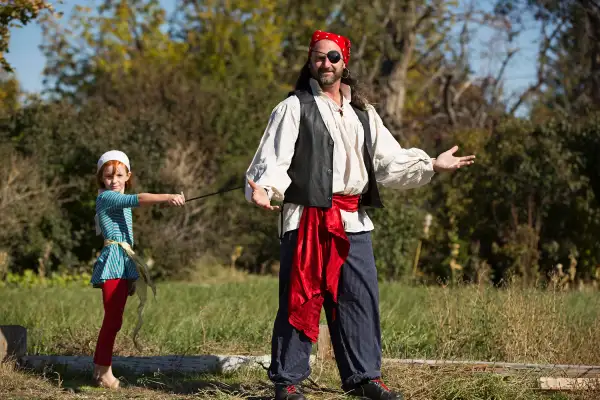The Science of Why Grownups Go Crazy for Halloween, Especially in Election Years

Once a fun and funky holiday with the focus squarely on kids, Halloween is now a full-blown adult festival. In the past decade, national spending on Halloween has mushroomed from $5 billion to an estimated record high of $8.4 billion this year, according to the National Retail Federation.
The lion’s share of this growth is the result of adults getting in on the action. About one-third of adults donned Halloween costumes a decade ago; today nearly half dress up. They’re spending more, too. In 2010, adults spent about 15% more than kids on their costumes; today they spend 42% more. Clearly, adult Halloween revelry is scratching a psychological itch.
As further evidence of that itch, consider that Halloween spending bumps up an additional 12% to 18% during presidential election years. This isn't due to toddlers begging to dress up like Sarah Palin and Bernie Sanders. And while political candidates offer some new costume inspiration for adults, this kind of spending is not significant enough to account for that double-digit increase in Halloween expenditures every four years. The real reasons go much deeper.
Here are five psychological benefits that explain why Halloween has become so popular with adults—especially during election years.
1. Vacation from Stressful Lives (and Elections)
The most obvious benefit of Halloween is that it’s socially sanctioned fun and silliness. Whether it’s seizing the opportunity to wear kitty ears to work, eat candy, dress your dog as a pumpkin, or party like a rock star (or taco or belly dancer), Halloween is an escape. And when the country tenses up with rage and vitriol due to endless political campaigning, we all need an escape more than ever.
Read Next: The Science of Why We Buy Clothes We Never Wear
2. Neglected Id Gets to Come Out and Play
Responsible adults work hard to regulate and suppress their childlike instincts and desires—what Freud called the id. The id is the spunky (but also selfish and irresponsible) part of your personality that urges us to do things like “Eat the whole cake!” or skip work and sleep in, or call your neighbor a doofus.
Civilization requires that the id be tamped down. But for many of our hardest working, most responsible citizens, their id is struggling for any sort of voice at all in their lives. Enter the power of the costume. When you're wearing a mask or playing a role, it feels more acceptable to act on your inner badness. We all simply feel freer to indulge out instincts when we've swapped our normal workaday costumes for goofy, outrageous, scary, or anarchic Halloween costumes.
3. Power of Creativity and Fantasy
The mental engagement and inspiration of creativity, fantasy, and escape are intoxicating—but also not a big part of the typical adult’s busy, harried life. Planning and executing a Halloween costume or home decorations engages those often neglected parts of our brains. And we’re more inspired than ever by the clever ideas we find on social media and in stores today.
4. Showing Off and Socializing
Costumes and Halloween parties give us an excuse to talk to (and flirt with) one another, make new friends, and cement older relationships. Talking and connecting with others is a tonic: Everything, even election angst, is easier to cope with when we feel connected to other people. Plus, because of the power of the global costume contest (otherwise know as social media), people get more bang (attention and connection) than ever from their costuming efforts.
Read Next: The Science of How Marketers (and Politicians) Manipulate Us
5. Conquering Fear
Halloween has traditionally been about dressing as a representative of our deepest psychological mystery and fear: death. Ghosts, zombies, vampires, and killers have been favorites for years. By role-playing what we fear, we feel more powerful and in control of those fears.
While death itself has maintained its psychological power, its ghoulish Halloween representatives have not. Frankly, they’ve become a cliche. This has made the definition and dress-up rules of Halloween more fluid, which has expanded its allure. As a bonus, the original benefits of Halloween aren’t lost. We can wear scary masks and feel powerful, if we feel like it. We can also dress up in silly costumes, including some that make fun with our political leaders. After all, humor is one of the most powerful ways to triumph over our fears.
Kit Yarrow, Ph.D., is a consumer psychologist who is obsessed with all things related to how, when, and why we shop and buy. She conducts research through her professorship at Golden Gate University and shares her findings in speeches, consulting work, and her books, Decoding the New Consumer Mind and Gen BuY.